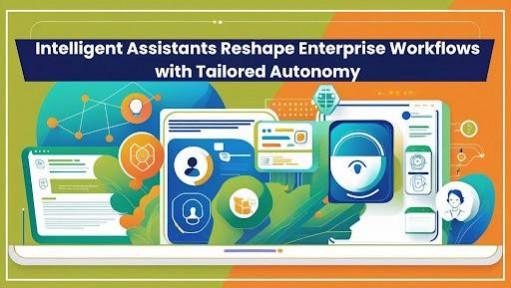
In an era defined by digital transformation, the role of intelligent automation is more crucial than ever. Dileep Kumar Hamsaneni Gopalaswamy, a visionary in enterprise software systems, presents a comprehensive exploration of next generation automation in his recent article. With a keen focus on AI integrated solutions, his work delves into how intelligent agents are revolutionizing enterprise functions.
Agents with Judgment: Rethinking Enterprise Automation
Modern business environments demand tools that do more than just follow scripts. The rise of intelligent assistants autonomous AI agents powered by large language models marks a pivotal change in automation. These agents are embedded within digital ecosystems and possess reasoning capabilities that allow them to independently manage workflows, make decisions, and learn from prior interactions. This innovation not only replaces repetitive manual tasks but also fosters real time collaboration with human employees, offering a dynamic, evolving approach to enterprise operations.
Taskmasters of the Digital Age
AI agents are no longer limited to narrow tasks. Categorized into supervisory, utility, and specialist roles, they tackle diverse challenges across departments. In talent management, they assist with onboarding and career development. Finance agents automate invoice approvals and expense matching. Sales agents help generate leads and quotes, while supply chain agents enhance procurement and logistics. These intelligent assistants now contribute across major operational areas, streamlining workflows, reducing inefficiencies, and significantly improving task execution throughout the enterprise landscape.
Quantified Impact: Turning Metrics into Milestones
The measurable benefits of integrating intelligent agents are compelling. Business functions once bogged down by inefficiencies now report dramatic improvements. For example, predictive maintenance agents have cut equipment downtime by up to 50%, while route optimization systems are driving down fuel consumption by 15%. Demand forecasting errors are down by 20%, and supplier collaboration has improved by 25%. In human resources, faster onboarding translates to quicker productivity. These metrics underscore how strategic automation is reshaping productivity, decision making, and bottom line performance.
Building the Next Generation of AI Systems
A transformative feature introduced to support this evolution is the AI Agent Studio. This platform empowers organizations to not only deploy but also customize their AI agents without licensing barriers. Teams can orchestrate groups of agents to collaboratively address complex processes, supported by templates, API integration, and trust focused validation tools. This democratization of AI creation, accessible even to team leads without deep technical expertise, enables businesses to develop workflows tailored to their specific goals while maintaining security and oversight.
Integration Without Friction
What sets these AI agents apart is their ability to integrate seamlessly with both internal systems and third party platforms. Direct access to enterprise APIs and data lakes ensures that they operate within trusted business rules. Meanwhile, external integrations through secure APIs expand their reach across broader IT ecosystems. This dual capability ensures continuity and coherence across different platforms, reinforcing the role of these agents as reliable collaborators within complex digital environments.
Facing the Future: Vision and Vigilance
While the promise is significant, successful implementation isn't without hurdles. Scaling these systems requires robust infrastructure and meticulous data hygiene. Ensuring accurate outputs depends on real time, clean data inputs. Privacy and governance also loom large, especially when agents deal with proprietary or sensitive data. Human oversight remains essential to guide, refine, and intervene when necessary. Addressing these factors is critical to unlocking the full potential of AI powered transformation.
In conclusion, Dileep Kumar Hamsaneni Gopalaswamy highlights how intelligent agents are redefining enterprise operations. With scalable platforms, collaborative agent teams, and seamless integration, these innovations go beyond enhancing workflows. As businesses adopt these tools, they unlock greater agility, efficiency, and intelligence, paving the way for a more adaptive and future-ready enterprise landscape.

















